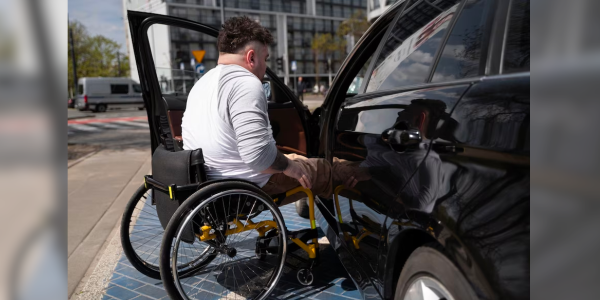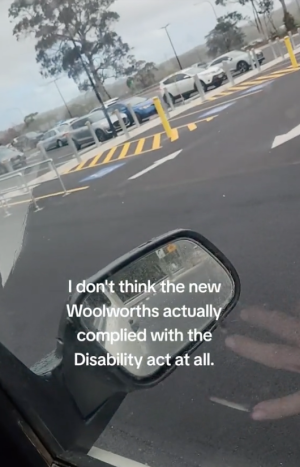‘Discriminatory’ detail in the car park of a recently opened Woolworths store left shoppers outraged
By
VanessaC
- Replies 54
Woolworths have recently come under fire after a local customer noticed an inexcusable detail in the car park of a brand new store.
The Mount Barker South store in South Australia recently opened to the public—and what the shopper noticed is reportedly a major oversight from the supermarket giant.
The disgruntled customer named Leonie Tagan aired her sentiments on social media and pointed out that the store’s car park had fourteen spaces for parents with prams near the entrance—and only one for shoppers with disabilities.
In her video, she said that there were 'three to four' more spaces on the other side of the road. However, they highlighted the dangers of trying to traverse such roads, especially for those in wheelchairs.
'I just finally went to the new Woolworths that opened in Mount Barker recently, and I am extremely disappointed and actually really angry at how I guess unimportant disabilities are to them.'
'The store itself was great, lovely, nice and new—but there is one disabled park near the front door, and there are 14 pram parks.
'And then across the actual road, the main road in, there are three or four other disability parks.
'So my problem is all those pram parks should not be that close. That should be disability car parks, and then at the end of that row should be where the pram parks are.'
Tagan, who uses a wheelchair herself, also explained the dangers of moving through a car park in a wheelchair.
'I would have to park and roll across the traffic, and it’s really hard to see over cars, and cars can’t see me,' she said.
'It is extremely dangerous, and it’s very discriminatory of the brand new Woolworths.'
She also acknowledged how useful the parking spaces may be for parents but claimed that they do not need to be so close to the entrance.
'That’s where people with disabilities need access,' Tagan added.
'The other thing is disability parks are permit spaces and legally need to be provided at these places—whereas pram parks are courtesy parks.'
'Yes, we can park in these car [spaces], but they’re actually too narrow for me to exit my vehicle in a wheelchair. I actually need it, you know, space to get out of the wheelchair.'
The news was met with outrage from other users and parents themselves, with one saying: 'As a parent, I agree! I just wanted wider parks, not closest when I had little kids!'
While another parent said: 'If they ask parents, we will say we are happy to park way out the back as long as the space is wider! We don’t care about the door distance!'
'Woolworths, do better!' A third added.
While a fourth shared: 'It’s the same with the new one at Clarkson! I’m always so worried I’ll fall whilst crossing the road. It’s so frustrating.'
Woolworths responded and acknowledged the community’s feedback on the issue.
'We’re aware of feedback related to disability car parking spaces at our new Mt Barker store,' the supermarket’s spokesperson said.
'We’re working with the landlord to input an extra two disability car parking spaces adjacent to the front entrance.'
'This change will be completed over the coming weeks.'
You can watch Leonie Tagan’s full video below:
Source: TikTok/@leonietagan.
Guidelines for Accessible Parking in a Commercial Space
The incident shared by one shopper is a reminder that commercial premises all over need to adhere to the basic principles of accessibility. Although the blueprint for setting up ideal parking spaces varies, there are universal guidelines often proposed by disability rights organisations that businesses should consider.
First, accessible parking spaces need to be located as close as possible to the entrance of a store or mall. This dramatically reduces the distance persons with mobility difficulties have to cover.
Moreover, it's crucial to consider the size of these parking spaces. Generally, these should be wider than conventional parking lots to accommodate wheelchairs or other mobility equipment conveniently. Extra space can be a lifeline because it allows vehicle doors to be fully opened to ease the transition from vehicle to wheelchair or vice versa.
To cap it off, clear marking and signage are an absolute must. Proper signage ensures that these spaces do not go unnoticed or get misused by persons who don't genuinely need them.
 What are your thoughts on this shopper’s sentiments? Let us know in the comments below!
What are your thoughts on this shopper’s sentiments? Let us know in the comments below!
The Mount Barker South store in South Australia recently opened to the public—and what the shopper noticed is reportedly a major oversight from the supermarket giant.
The disgruntled customer named Leonie Tagan aired her sentiments on social media and pointed out that the store’s car park had fourteen spaces for parents with prams near the entrance—and only one for shoppers with disabilities.
In her video, she said that there were 'three to four' more spaces on the other side of the road. However, they highlighted the dangers of trying to traverse such roads, especially for those in wheelchairs.
'I just finally went to the new Woolworths that opened in Mount Barker recently, and I am extremely disappointed and actually really angry at how I guess unimportant disabilities are to them.'
'The store itself was great, lovely, nice and new—but there is one disabled park near the front door, and there are 14 pram parks.
'And then across the actual road, the main road in, there are three or four other disability parks.
'So my problem is all those pram parks should not be that close. That should be disability car parks, and then at the end of that row should be where the pram parks are.'
Tagan, who uses a wheelchair herself, also explained the dangers of moving through a car park in a wheelchair.
'I would have to park and roll across the traffic, and it’s really hard to see over cars, and cars can’t see me,' she said.
'It is extremely dangerous, and it’s very discriminatory of the brand new Woolworths.'
She also acknowledged how useful the parking spaces may be for parents but claimed that they do not need to be so close to the entrance.
'That’s where people with disabilities need access,' Tagan added.
'The other thing is disability parks are permit spaces and legally need to be provided at these places—whereas pram parks are courtesy parks.'
'Yes, we can park in these car [spaces], but they’re actually too narrow for me to exit my vehicle in a wheelchair. I actually need it, you know, space to get out of the wheelchair.'
The news was met with outrage from other users and parents themselves, with one saying: 'As a parent, I agree! I just wanted wider parks, not closest when I had little kids!'
While another parent said: 'If they ask parents, we will say we are happy to park way out the back as long as the space is wider! We don’t care about the door distance!'
'Woolworths, do better!' A third added.
While a fourth shared: 'It’s the same with the new one at Clarkson! I’m always so worried I’ll fall whilst crossing the road. It’s so frustrating.'
Woolworths responded and acknowledged the community’s feedback on the issue.
'We’re aware of feedback related to disability car parking spaces at our new Mt Barker store,' the supermarket’s spokesperson said.
'We’re working with the landlord to input an extra two disability car parking spaces adjacent to the front entrance.'
'This change will be completed over the coming weeks.'
You can watch Leonie Tagan’s full video below:
Source: TikTok/@leonietagan.
Guidelines for Accessible Parking in a Commercial Space
The incident shared by one shopper is a reminder that commercial premises all over need to adhere to the basic principles of accessibility. Although the blueprint for setting up ideal parking spaces varies, there are universal guidelines often proposed by disability rights organisations that businesses should consider.
First, accessible parking spaces need to be located as close as possible to the entrance of a store or mall. This dramatically reduces the distance persons with mobility difficulties have to cover.
Moreover, it's crucial to consider the size of these parking spaces. Generally, these should be wider than conventional parking lots to accommodate wheelchairs or other mobility equipment conveniently. Extra space can be a lifeline because it allows vehicle doors to be fully opened to ease the transition from vehicle to wheelchair or vice versa.
To cap it off, clear marking and signage are an absolute must. Proper signage ensures that these spaces do not go unnoticed or get misused by persons who don't genuinely need them.
Key Takeaways
- A Woolworths customer has criticised the supermarket chain over parking spaces at its new Mount Barker South store in South Australia.
- The car park has fourteen spaces for parents with prams near the entrance, but only one for shoppers with disabilities.
- The shopper has accused Woolworths of discrimination and explained that navigating through traffic from the designated disability parking spots can be dangerous.
- A Woolworths spokesperson confirmed that the supermarket plans to add two more disability parking spaces to the supermarket entrance following community feedback.









